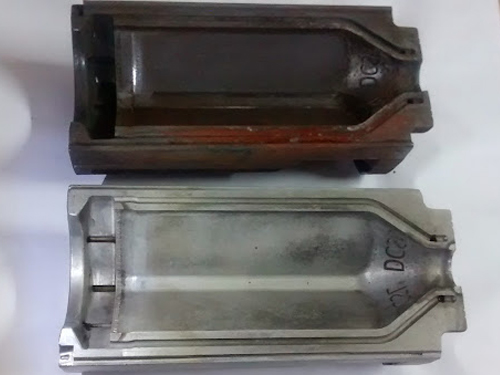
Glass Mold Cleaning
Introduction: Glass molds play a critical role in the glass manufacturing industry, shaping molten glass into desired forms and ensuring the production of high-quality glass products. However, over time, these molds can accumulate residues, such as glass fragments, coatings, or contaminants, impacting the quality and efficiency of the glass manufacturing process. Proper cleaning of glass molds is essential to maintain precision, consistency, and the overall quality of glass products. In this article, we will explore the importance of glass mold cleaning, the cleaning methods used, and the benefits it brings to the glass manufacturing process.
Importance of Glass Mold Cleaning: Regular cleaning of glass molds is crucial for several reasons:
- 1.Consistency in Glass Production: Clean molds ensure consistent glass production, as any residues or contaminants can affect the shape, surface quality, and dimensions of the glass products. Proper mold cleaning helps maintain precision and uniformity in glass manufacturing.
- 2.Reduced Defects and Rejects: Residues or contaminants on glass molds can lead to defects or blemishes on the glass products. By thoroughly cleaning the molds, manufacturers can minimize surface imperfections, such as bubbles, streaks, or marks, resulting in a higher percentage of acceptable glass products and reduced reject rates.
- 3.Extended Mold Lifespan: Regular cleaning and maintenance of glass molds help prolong their lifespan. Removing residues and contaminants prevents the corrosion, wear, or damage that can occur over time, ensuring the molds retain their integrity and functionality.
Cleaning Methods: Glass mold cleaning involves various methods depending on the type and extent of contamination:
- 1.Mechanical Cleaning: Mechanical cleaning methods involve physically removing residues and contaminants from the mold surfaces. This can be done using brushes, scrapers, or specialized cleaning tools. Mechanical cleaning is effective for removing loose or easily detachable materials from the mold surfaces.
- 2.Chemical Cleaning: Chemical cleaning utilizes cleaning agents or solvents specifically formulated to dissolve or break down residues on glass molds. The cleaning agents are selected based on the type of contaminants and the material of the molds. Chemical cleaning is particularly effective for removing stubborn or hardened deposits.
- 3.Thermal Cleaning: Thermal cleaning involves subjecting the glass molds to controlled heat to remove residues or coatings. The elevated temperatures soften and detach the contaminants from the mold surfaces, making them easier to remove. Thermal cleaning is commonly used for molds with heat-resistant materials or for the removal of organic coatings.
Benefits of Glass Mold Cleaning: Proper cleaning of glass molds offers several benefits to the glass manufacturing process :
- 1. Consistent Glass Quality: Clean molds ensure consistent glass quality by preventing surface defects, such as bubbles, streaks, or marks. This results in glass products with uniform appearance, surface smoothness, and dimensional accuracy.
- 2. Improved Production Efficiency: Regular mold cleaning reduces production interruptions caused by mold-related issues. Clean molds promote smooth glass release, minimizing downtime for cleaning or maintenance, and increasing overall production efficiency.
- 3. Extended Mold Lifespan: Proper mold cleaning and maintenance help extend the lifespan of glass molds. By preventing corrosion, wear, or damage, the molds remain in good condition, reducing the need for frequent replacements and resulting in cost savings for manufacturers.
- 4.Enhanced Safety and Hygiene: Clean molds contribute to a safe and hygienic production environment. Removing residues and contaminants reduces the risk of glass product contamination, ensuring the safety and quality of the final glass products.
